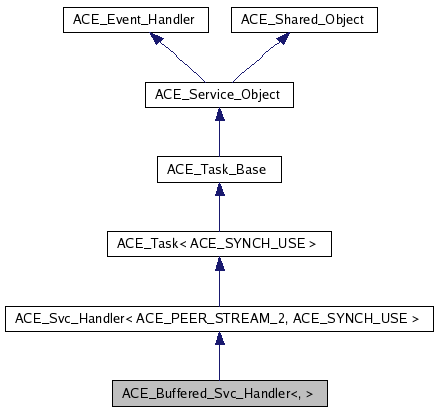ACE_Buffered_Svc_Handler<, > Class Template Reference
Defines the interface for a service that exchanges data with its connected peer and supports buffering. More...
#include <Svc_Handler.h>


Public Member Functions | |
| ACE_Buffered_Svc_Handler (ACE_Thread_Manager *thr_mgr=0, ACE_Message_Queue< ACE_SYNCH_USE > *mq=0, ACE_Reactor *reactor=ACE_Reactor::instance(), size_t max_buffer_size=0, ACE_Time_Value *relative_timeout=0) | |
| virtual | ~ACE_Buffered_Svc_Handler (void) |
| Destructor, which calls <flush>. | |
| virtual int | put (ACE_Message_Block *message_block, ACE_Time_Value *timeout=0) |
| virtual int | flush (void) |
| virtual int | handle_timeout (const ACE_Time_Value &time, const void *) |
| void | dump (void) const |
| Dump the state of an object. | |
Protected Member Functions | |
| virtual int | flush_i (void) |
Protected Attributes | |
| size_t | maximum_buffer_size_ |
| size_t | current_buffer_size_ |
| Current size in bytes of the <Message_Queue> contents. | |
| ACE_Time_Value | next_timeout_ |
| Timeout value used to control when the buffer is flushed. | |
| ACE_Time_Value | interval_ |
| Interval of the timeout. | |
| ACE_Time_Value * | timeoutp_ |
| Timeout pointer. | |
Detailed Description
template<ACE_PEER_STREAM_1, ACE_SYNCH_DECL>
class ACE_Buffered_Svc_Handler<, >
Defines the interface for a service that exchanges data with its connected peer and supports buffering.
The buffering feature makes it possible to queue up ACE_Message_Blocks in an ACE_Message_Queue until (1) the queue is "full" or (2) a period of time elapses, at which point the queue is "flushed" via <sendv_n> to the peer.
Constructor & Destructor Documentation
| ACE_Buffered_Svc_Handler<, >::ACE_Buffered_Svc_Handler | ( | ACE_Thread_Manager * | thr_mgr = 0, |
|
| ACE_Message_Queue< ACE_SYNCH_USE > * | mq = 0, |
|||
| ACE_Reactor * | reactor = ACE_Reactor::instance (), |
|||
| size_t | max_buffer_size = 0, |
|||
| ACE_Time_Value * | relative_timeout = 0 | |||
| ) | [inline] |
Constructor initializes the thr_mgr and mq by passing them down to the ACE_Task base class. The reactor is passed to the ACE_Event_Handler. The max_buffer_size and relative_timeout are used to determine at what point to flush the mq. By default, there's no buffering at all. The relative_timeout value is interpreted to be in a unit that's relative to the current time returned by <ACE_OS::gettimeofday>.
| ACE_Buffered_Svc_Handler<, >::~ACE_Buffered_Svc_Handler | ( | void | ) | [inline, virtual] |
Destructor, which calls <flush>.
Member Function Documentation
| int ACE_Buffered_Svc_Handler<, >::put | ( | ACE_Message_Block * | message_block, | |
| ACE_Time_Value * | timeout = 0 | |||
| ) | [inline, virtual] |
Insert the ACE_Message_Block chain rooted at message_block into the ACE_Message_Queue with the designated timeout. The <flush> method will be called if this <put> causes the number of bytes to exceed the maximum buffer size or if the timeout period has elapsed.
Reimplemented from ACE_Task_Base.
| int ACE_Buffered_Svc_Handler<, >::flush | ( | void | ) | [inline, virtual] |
Flush the ACE_Message_Queue, which writes all the queued ACE_Message_Blocks to the <PEER_STREAM>.
| int ACE_Buffered_Svc_Handler<, >::handle_timeout | ( | const ACE_Time_Value & | time, | |
| const void * | ||||
| ) | [inline, virtual] |
This method is not currently implemented -- this is where the integration with the <Reactor> would occur.
Reimplemented from ACE_Svc_Handler< ACE_PEER_STREAM_2, ACE_SYNCH_USE >.
| void ACE_Buffered_Svc_Handler<, >::dump | ( | void | ) | const [inline] |
Dump the state of an object.
Reimplemented from ACE_Svc_Handler< ACE_PEER_STREAM_2, ACE_SYNCH_USE >.
| int ACE_Buffered_Svc_Handler<, >::flush_i | ( | void | ) | [inline, protected, virtual] |
Implement the flush operation on the ACE_Message_Queue, which writes all the queued ACE_Message_Blocks to the <PEER_STREAM>. Assumes that the caller holds the lock.
Member Data Documentation
size_t ACE_Buffered_Svc_Handler<, >::maximum_buffer_size_ [protected] |
Maximum size the <Message_Queue> can be before we have to flush the buffer.
size_t ACE_Buffered_Svc_Handler<, >::current_buffer_size_ [protected] |
Current size in bytes of the <Message_Queue> contents.
ACE_Time_Value ACE_Buffered_Svc_Handler<, >::next_timeout_ [protected] |
Timeout value used to control when the buffer is flushed.
ACE_Time_Value ACE_Buffered_Svc_Handler<, >::interval_ [protected] |
Interval of the timeout.
ACE_Time_Value* ACE_Buffered_Svc_Handler<, >::timeoutp_ [protected] |
Timeout pointer.
The documentation for this class was generated from the following files:
 1.5.5
1.5.5